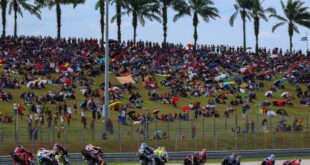HANGZHOU, China, Sept 23 — Tens of thousands of spectators at a packed stadium in Eastern city of Hangzhou let out a massive roar as Chinese President Xi Jinping was introduced and walked in at the opening ceremony of the 19th Asian Games on today.
A tired looking Xi smiled and waved to the crowd as he took his seat at the 80,000 capacity stadium alongside a number of other visiting dignitaries including International Olympic Committee President Thomas Bach and Syrian President Bashar al-Assad.
The Chinese flag was carried out by uniformed military personnel, “I love you China” and the Chinese national anthem were sung, then the athletes walked out, accompanied by some sprightly music.
The first team out was Afghanistan, whose female athletes, based abroad due to sport for women being banned by the Taleban, walked together with their male counterparts.
The Games, delayed a year due to China’s measures to combat the Covid-19 pandemic, will be the country’s biggest sporting event in over a decade in several metrics, with around 12,000 athletes from 45 nations competing in 40 sports.
Roads in a sizeable “traffic control area” around the city’s Olympic stadium were blocked off, at least one metro station was shut and other Games centres were closed and deliveries were disrupted today.
Some locals felt the security measures, always tight when Xi makes a visit, were overdone.
“I think it shows they’re too nervous, right?”, said 45-year-old Hangzhou resident Li Jian. “I think we should be a little more confident.”
A general view as people hold flags of the participant nations during the Opening Ceremony at the Hangzhou Olympic Sports Centre Stadium in Hangzhou, China, September 23, 2023. — Reuters pic
Organisers have not disclosed spending on the Games, though the Hangzhou government has said it spent more than 200 billion yuan (RM141 billion) in the five years through 2020 on transport infrastructure, stadiums, accommodation and other facilities.
Organisers hoped a high-tech opening ceremony today will help drum up excitement for the Games. Interest at home has been muted as the economy sputters and some question the cost of hosting the mega-event.
Dozens of smiling volunteers greeted arriving journalists in Hangzhou this week, with some expressing relief that the event was finally getting started.
The official slogan of the event, “Heart to Heart, @Future”, represents the goal of uniting the people and countries of Asia through these games, officials have said, but geopolitical tensions and rivalries threatened to overshadow that effort this week.
Xi called on the West to lift sanctions on Syria and offered Beijing’s help in rebuilding the war-shattered country yesterday during rare talks with the long-ostracised Syrian leader Bashar al-Assad.
Also yesterday, India protested over a visa issue that affected three of its athletes at the games, leading India’s sports minister Anurag Thakur to cancel his trip.
Japan’s top government spokesperson said on Tuesday that Tokyo would do its utmost to ensure the safety of Japanese nationals in China as the release of treated radioactive water from the Fukushima nuclear power plant into the sea has chilled ties.
“We should promote peace through sports, adhere to the principle of goodwill towards neighbours and mutual benefit and… resist the cold war mentality and confrontation between camps,” Xi told dignitaries including International Olympic Committee President Thomas Bach at a Saturday banquet, state news agency Xinhua reported. — Reuters
 BeritaKini.biz Berita Viral Terkini di Malaysia
BeritaKini.biz Berita Viral Terkini di Malaysia





